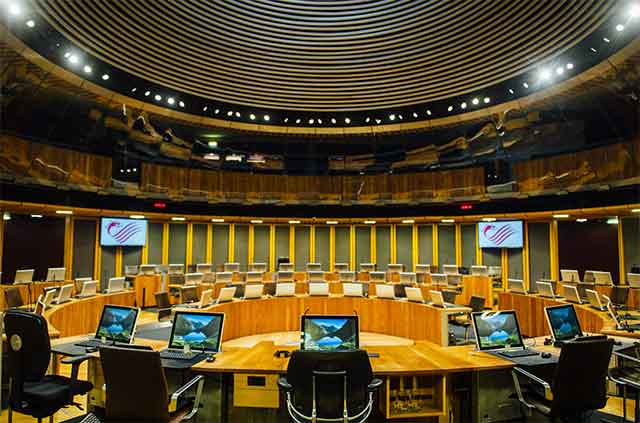Senedd members paused to remember one of the worst mining disasters in British history.
Lesley Griffiths told the Senedd that Wrexham experienced one of its darkest days on September 22, 1934 when 261 men and boys lost their lives at Gresford Colliery.
The Labour politician explained that the colliery, which closed in 1973, was one of the largest in the region, with more than 2,200 employees and 1,850 working underground.
She said: “On that Saturday at around 2am, halfway through the night shift, a devastating explosion ripped through the Dennis section of the mine.
“Ferocious fires spread rapidly through the dust-laden air. The men in the Martin shaft knew nothing about the explosion until word came to them to get out.”
‘Fires raged’
The Wrexham Senedd member said rescue parties endured the heat “but it is said it scorched the clothes on their backs and burnt the soles from their boots”.
“Wooden pit props burst into flames, causing the fire to spread and further explosions occurred which led to more rockfall,” she explained.
Leading a debate on April 2 to raise awareness of the disaster, Ms Griffiths told the Senedd many of the miners who escaped the Martin section worked to extinguish the fires.
“After 40 hours, all rescue parties were called up and the mineshaft was sealed,” she said. “The only way to extinguish the fires would be to starve them of oxygen.
“261 men and boys were killed in the explosion underground and the fires that raged as a result – the youngest was just 16 years of age.”
‘Unspeakable grief’
Ms Griffiths told the debating chamber or Siambr that only 11 bodies were recovered, leading to unspeakable grief for the relatives whose loved ones remained entombed underground.
She said three rescuers lost their lives, with another miner killed in a secondary explosion on the surface and the 266th dying after collapsing at a memorial service in the October.
The former minister, who is standing down at the 2026 election, said: “The management were under pressure to increase productivity so they allowed illegal double shifts.”
Ms Griffiths described the inquiry that followed the disaster as a sham despite a catalogue of failings and mismanagement, with pressure for more coal outweighing safety regulations.
She told Senedd members: “There are strong allegations that certain documents were fabricated and falsified to protect the owners.”
‘Embedded in our history’
“No-one was ever held accountable,” she said. “With the fine of around £150 relating to bookkeeping errors rather than circumstances surrounding the explosion.”
Describing the impact as unfathomable, she added: “Shockingly, men who worked that fateful night were docked four hours’ pay, half their wages for not completing their shift.”
Ms Griffiths said many people in Wrexham continue to feel the disaster was overlooked, “with the politics of the day enabling those in authority to not be held to account”.
Her Labour colleague Mick Antoniw told the Senedd that more than 6,000 people in Wales lost their lives in mining disasters, with tens of thousands suffering injury and illness.
“It’s embedded in our history and it’s important that the next generations and our education system actually know that history as well,” he said.
‘Debt of gratitude’
Welsh Liberal Democrat leader Jane Dodds, who was born and brought up in Wrexham five minutes away from Gresford, said the disaster defined the community.
She told the Siambr: “We must never ever forget the debt of gratitude we owe the people who lost their lives because they improved working conditions and began to form the unions that represent people and, hopefully, ensure that things like this never happen again.”
The Conservatives’ Sam Rowlands joined fellow Senedd members in paying tribute to the community for keeping the memory of Gresford alive for decades.
With meetings set to move to Tŷ Hywel while the Siambr is remodelled, former first minister Mark Drakeford said it seemed fitting to hold the final debate on an issue of such resonance.
He said: “In remembering the events of 90 years ago, we remind ourselves of those principles of social justice, community solidarity, collective action in the workplace and that sense of community resilience we are so fortunate still to have present here in Wales today.”

